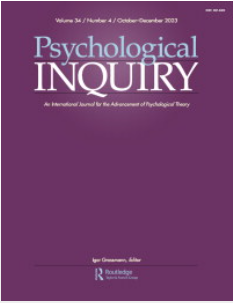Personal Agency and Social Support: Substitutes of Complements?
IF 4.1
2区 心理学
Q1 PSYCHOLOGY, MULTIDISCIPLINARY
引用次数: 0
Abstract
In their target article, Milyavsky et al. (this issue) make a strong case for the substitutability between personal agency and social support. Across various domains, they find that perceived personal agency decreases the reliance on social support and perceived social support decreases the perceptions of personal agency. In my own research, I observed a similar substitutability between personal and social control; for example, the presence of external controls such as parental supervision undermined self-control in pursuing academic goals (Fishbach & Trope, 2005). Furthermore, research on balancing (Dhar & Simonson, 1999; Fishbach, Zhang, & Koo, 2009) and licensing (Monin & Miller, 2001) often observed substitutability among the means to a goal. It is clear that personal agency and social support can be, and often are, substitutional means for goal achievement. This commentary starts where the target article ends— when (if ever) should we expect complementarity instead of substitutability between two means to achieving a goal? Milyavsky et al. (this issue) offer a boundary condition: agency and assistance should not undermine each other if one of them also serves as a means to another goal. Yet, I ask, when does perceiving one (agency or support) make it more likely that the person will also turn to the other? For example, when learning a new skill (such as playing tennis or speaking Yiddish), is it possible that the perception of social support makes people more confident in their personal ability, or that perceived ability increases the chances that the person will also seek assistance? Possibly, to master these skills, it is insufficient to rely on one means only. The learner would benefit from multiple routes or, alternatively, from a backup plan (i.e., if one means fails, they can rely on the other). The notion that personal agency and social support could at times complement each other is consistent with a key tenet of Goal System Theory: Equifinal means, while often imposing redundancy (“all roads lead to Rome”), also increase confidence (the traveler is pretty confident she will make it to Rome, one way or another). Thus, while the advantage of multifinal means to a goal is that they maximize attainment (“feeding two birds with one scone”), their disadvantage is that these means could undermine (“dilute”) the perceived instrumentality of each means to the goal. And while the advantage of equifinal means is that they increase confidence, the person feels that a goal is within reach; the disadvantage is that they can be substitutable. Many (but not all the) times, pursuing one of these means will trigger disengagement with the other.个人代理与社会支持:补语的替代品?
在他们的目标文章中,Milyavsky等人(本期)强有力地证明了个人代理和社会支持之间的可替代性。在各个领域,他们发现感知到的个人能动性降低了对社会支持的依赖,而感知到的社会支持降低了对个人能动性的感知。在我自己的研究中,我观察到个人控制和社会控制之间存在类似的可替代性;例如,父母监督等外部控制的存在削弱了追求学业目标的自我控制(Fishbach & Trope, 2005)。此外,关于平衡的研究(Dhar & Simonson, 1999;Fishbach, Zhang, & Koo, 2009)和licensing (Monin & Miller, 2001)经常观察到实现目标的手段之间的可替代性。很明显,个人能动性和社会支持可以而且经常是实现目标的替代手段。这篇评论从目标文章的结尾开始——什么时候(如果有的话)我们应该期待两种实现目标的手段之间的互补而不是替代?Milyavsky等人(本期)提出了一个边界条件:如果其中一方也作为实现另一个目标的手段,代理和援助不应该相互破坏。然而,我问,什么时候感知到一个(代理或支持)会让人更有可能转向另一个?例如,当学习一项新技能(如打网球或说意第绪语)时,是否有可能对社会支持的感知使人们对自己的个人能力更有信心,或者这种感知能力增加了人们寻求帮助的机会?可能,要掌握这些技能,仅仅依靠一种手段是不够的。学习者将受益于多种路径,或者,从一个备用计划(即,如果一个方法失败,他们可以依靠另一个)。个人行为和社会支持有时可以相辅相成,这一概念与目标系统理论的一个关键原则是一致的:等效的手段,虽然经常造成冗余(“条条大路通罗马”),但也增加了信心(旅行者非常自信,无论如何她都会到达罗马)。因此,虽然实现目标的多种最终手段的优势在于它们可以最大限度地实现目标(“用一个烤饼喂两只鸟”),但它们的缺点是这些手段可能会削弱(“稀释”)实现目标的每种手段的感知工具性。虽然等量方法的好处是增加了信心,但人们会觉得目标触手可及;缺点是它们可以被替代。很多时候(但不是全部),追求其中一种方式会引发与另一种方式的脱节。
本文章由计算机程序翻译,如有差异,请以英文原文为准。
求助全文
约1分钟内获得全文
求助全文
来源期刊

Psychological Inquiry
PSYCHOLOGY, MULTIDISCIPLINARY-
CiteScore
10.30
自引率
1.10%
发文量
31
期刊介绍:
Psychological Inquiry serves as an international journal dedicated to the advancement of psychological theory. Each edition features an extensive target article exploring a controversial or provocative topic, accompanied by peer commentaries and a response from the target author(s). Proposals for target articles must be submitted using the Target Article Proposal Form, and only approved proposals undergo peer review by at least three reviewers. Authors are invited to submit their full articles after the proposal has received approval from the Editor.
 求助内容:
求助内容: 应助结果提醒方式:
应助结果提醒方式:


